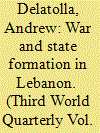|
|
|
Sort Order |
|
|
|
Items / Page
|
|
|
|
|
|
|
| Srl | Item |
| 1 |
ID:
181284


|
|
|
|
|
| Summary/Abstract |
Lebanese political dynamics are often characterized by political confessionalism, neo-liberal economics, corruption, and its particularity as an Arab state with Western social orientations. Although these characterizations may seem, at times, contradictory, this article argues that they are part of a political structure that initially developed during the Civil War (1975–1990) that was sustained by Lebanon’s post-conflict power sharing agreement. This article builds on the critiques present in the developing scholarship on post-conflict power sharing, demonstrating how dynamics established as a consequence of the Civil War continued into the post-conflict period. This has led to the reproduction of sectarian boundary inflammation, limitations on democratic and civil society mobilisation, and political stagnation. The article concludes with an analysis of the 2015 Garbage Crisis as exemplary of sustained Civil War dynamics and the consequent constraints on civil society mobilisation caused by these dynamics.
|
|
|
|
|
|
|
|
|
|
|
|
|
|
|
|
| 2 |
ID:
170366


|
|
|
|
|
| Summary/Abstract |
In recent decades, international events and incisive critical voices have catapulted the concepts of race and religion to the foreground of International Relations research. In particular, scholars have sought to recover the racialized and imperial beginnings of IR as an academic discipline in the early-20th century. This article contributes to this growing body of work by analyzing both race and religion as conceptual tools of scientific imperial administration—tools that in the 19th century classified and divided the global periphery along a continuum of civilizational and developmental difference. The article then applies this framework to the case of French, and more broadly, European, relations with populations in the Ottoman Empire, particularly within the Syrian Provinces. As described throughout this article and the case study, the Europeans used the language of race to contribute to religious hierarchies in the Syrian provinces in the mid- and late-19th century, having a lasting effect on discussions of religion in IR and international politics.
|
|
|
|
|
|
|
|
|
|
|
|
|
|
|
|
| 3 |
ID:
171843


|
|
|
|
|
| Summary/Abstract |
In recent years, acceptance and tolerance of homosexuality has become symbolic of Western liberal, social, and political progress. This has been noted in discussions on homonormativity, homonationalism, and homocolonialism. While some of these discussions have touched on the intersections between sexuality, race, gender, and class, this article argues that this relationship has been historically produced as a standard of civilization. It notes that the politics and governance of sexuality, and its intersections with race, gender, and class, have historical relevance in producing social and political exclusions. In building this argument, the article considers how the politics and governance of sexuality have maintained a “divided world,” from the nineteenth century to the twenty-first century, transforming from a hetero- to a homocolonial standard of civilization. It draws from a number of examples, from the nineteenth century to the contemporary period, using a diverse set of materials, including ethnographic research, fieldwork, and historical documents to explain temporal and geographic connections regarding the politics of sexuality.
|
|
|
|
|
|
|
|
|
|
|
|
|
|
|
|
| 4 |
ID:
143578


|
|
|
|
|
| Summary/Abstract |
State formation in the developing world can be explained as growing centralisation and institutionalisation. To understand why some states struggle with state formation, or the processes of centralisation, the model provided by Charles Tilly, in his analysis of state formation in Western Europe, is applied to Lebanon, starting at the onset of the 1975 civil war and concluding with an analysis of the post-Syrian occupation environment. With the appropriate conditions it is possible to use Tilly’s model of war making and the state to measure state formation, or the lack thereof, in the developing world. Conclusively, in the case of Lebanon, it is evident that progress towards strong state formation has been made because of processes of war that are similar to those Tilly outlines in his historical analysis of Western Europe.
|
|
|
|
|
|
|
|
|
|
|
|
|
|
|
|
|
|
|
|
|